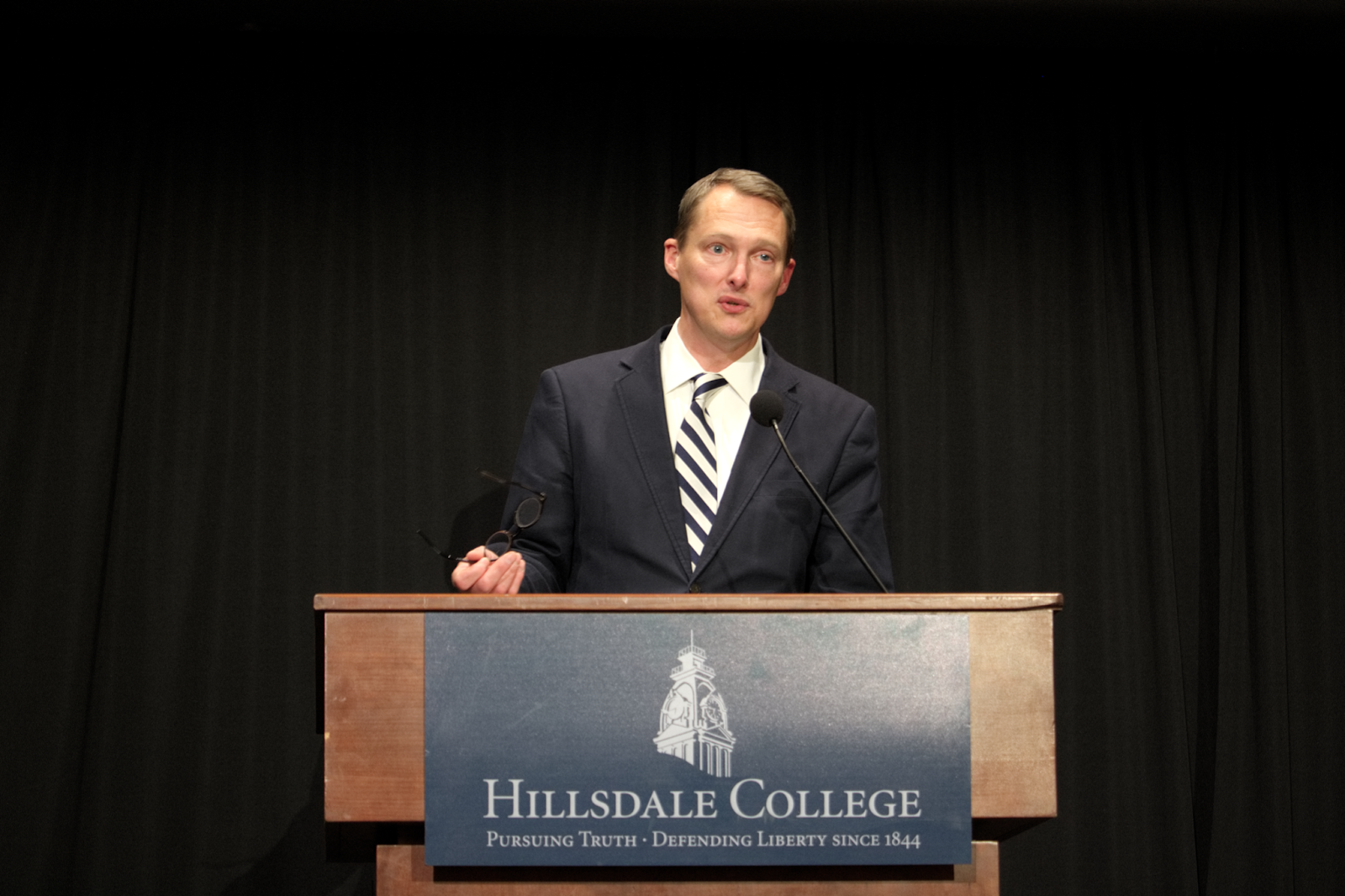
We are living in Robert Bork’s America, and it’s the fault of liberalism, according to Barton Swaim.
Swaim, a political books columnist for the Wall Street Journal and the spring 2021 Eugene C. Pulliam Distinguished Visiting Fellow in Journalism, gave a public lecture on April 20, titled, “You Can’t Argue with the Righteous: Is Political Debate a Thing of the Past?”
At the U.S. Senate hearings for Robert Bork’s nomination to the U.S. Supreme Court in 1987, then-senator Ted Kennedy from Massachussets famously smeared “Robert Bork’s America” as a place where “women would be forced into back-alley abortions, blacks would sit at segregated lunch counters, rogue police could break down citizens’ doors in midnight raids, and schoolchildren could not be taught about evolution, writers and artists could be censored at the whim of the government, and the doors of the federal courts would be shut on the fingers of millions of citizens.”
Swaim argued that Kennedy’s prediction has come true, not as a result of Reagan’s failed Supreme Court nominee or the work of conservatives, nor because Kennedy was a political prophet. Rather, this is a direct result of progressive liberalism, Swaim said.
This is because American liberalism has transmuted into something new, Swaim said. While liberalism set out to end segregation, to protect freedom of speech, to bring about radical sexual autonomy, and to expand the welfare state, it succeeded at each of these goals long ago and is thus grasping for new goals which undercut those it achieved.
“Liberalism has long since accomplished whatever it was going to accomplish,” he said. “It has failed in whatever it was prone to fail at, and there is nothing left for it to do.”
You cannot argue with liberals, Swaim said, because they see their cause as inherently righteous, and all who disagree with them as inherently “racist,” “sexist” or part of a “weird religious cult,” as in the case of Associate Justice of the Supreme Court Amy Coney Barrett.
“But what else can progressives do?” Swaim asked. “They have enormous power, but are bereft of a coherent philosophy.”
Where is it headed? Swaim, a Presbyterian, offered a Christian solution.
“The United States is a fundamentally religious nation. I think what is motivating the aggressive behavior on the left, especially among the young, is, in my view, a religious impulse,” Swaim said. “The desire to find meaning converging in some kind of struggle — hence the harrowing spectacles of public confessions in the absence of wrongdoing; hence the promulgation of strict codes of speech and conduct; hence the refusal to reason, or consider counter evidence — again, you can’t reason with the righteous. These, and I say this as a religious person myself, are the worst manifestations of religious symbols.”
The solution, for Swaim, is found in religion, rightly construed: centered in the church and governed by scripture.
“If the churches and synagogues stop trying to keep up and start proclaiming their distinctive and ancient messages without apology, the whole cultural and political landscape could change,” Swaim said. “I don’t know how it could change. But if we rob progressivism of its appeal, we might destroy it altogether. You can’t reason with the righteous, but as Jesus Christ showed us, you can reason with the unrighteous.”
Elizabeth Schlueter, wife of Nathan Schlueter, professor of philosophy, asked Swaim if progressivism is related to Marxism.
“I really appreciated your locating the heart of the new progressivism in this religious impulse,” Schlueter said. “When you described it, several of the elements you mentioned reminded me of Marxist ideology in its heyday, especially perhaps its beginnings. And I wonder if you think this new impulse has any relation or might be a mutation of Marxist ideology or is it something entirely different, in your opinion?”
Swaim said they are related: Marxism has always been a manifestation of a religious impulse, at a basic level, and American progressivism has always had a Marxism element.
Distinguished Associate Professor of History Darryl Hart said he agreed with Swaim’s argument that progressivism is unsustainable.
“I don’t understand why the cultural elites can’t see that,” Hart said. “Even the corporations — they want to sell their products. It’s a strange phenomenon that people would be so committed to an ideal, assumingly, and then not worry about the results.”
He added that using Kennedy as a frame was clever.
“There was a fair amount of red meat in it — in a good way, it was maybe medium-rare,” Hart said. “And of course, he ended with an appeal to religion, and that being perhaps a source of hope and stability for the future.”

